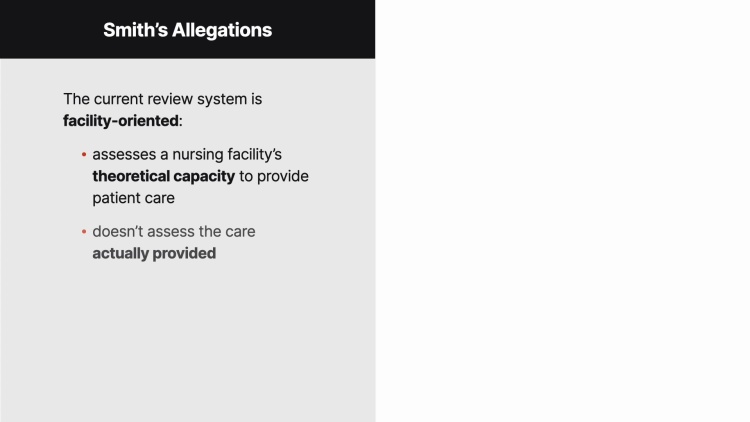In re The Estate of Michael Patrick Smith v. Heckler
United States Court of Appeals for the Tenth Circuit
747 F.2d 583 (1984)
- Written by Craig Conway, LLM
Facts
The Estate of Michael Patrick Smith (the Estate) (plaintiff) brought a class action suit against Heckler, the Secretary of the U.S. Department of Health and Human Services (HHS) (defendant). The suit was brought on behalf of Medicaid recipients residing in Colorado nursing homes. The Estate alleged that Heckler had a statutory duty under the Medicaid Act to develop and implement a compliance review and enforcement mechanism to ensure that residents in Medicaid-certified nursing homes received quality health care. The Estate argued that Heckler did not meet the statutory mandate because the enforcement system was “facility-oriented,” instead of “patient-oriented.” The Medicaid Act gives the HHS Secretary the authority to make an independent determination of whether the facility is compliant separate from any state determination. The Estate argued that the Heckler’s method of review evaluated only the physical facilities providing the care and did not adequately determine the quality of care delivered to residents. The district court held that Hecker’s decision not to use a “patient-oriented” system was not a violation of the Secretary’s statutory duty and found that the State of Colorado would have been the proper defendant because it was responsible for developing and enforcing standards to ensure quality resident care. The Estate appealed the district court’s decision.
Rule of Law
Issue
Holding and Reasoning (McKay, J.)
What to do next…
Here's why 907,000 law students have relied on our case briefs:
- Written by law professors and practitioners, not other law students. 47,100 briefs, keyed to 996 casebooks. Top-notch customer support.
- The right amount of information, includes the facts, issues, rule of law, holding and reasoning, and any concurrences and dissents.
- Access in your classes, works on your mobile and tablet. Massive library of related video lessons and high quality multiple-choice questions.
- Easy to use, uniform format for every case brief. Written in plain English, not in legalese. Our briefs summarize and simplify; they don’t just repeat the court’s language.





